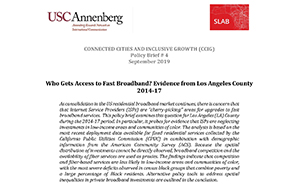CONNECTED CITIES AND INCLUSIVE GROWTH (CCIG)
Policy Brief # 4 September 2019
Who Gets Access to Fast Broadband? Evidence from Los Angeles County 2014-17
As consolidation in the US residential broadband market continues, there is concern that that Internet Service Providers (ISPs) are “cherry-picking” areas for upgrades to fast broadband services. This policy brief examines this question for Los Angeles (LA) County during the 2014-17 period. In particular, it probes for evidence that ISPs are neglecting investments in low-income areas and communities of color. The analysis is based on the most recent deployment data available for fixed residential services collected by the California Public Utilities Commission (CPUC) in combination with demographic information from the American Community Survey (ACS). Because the spatial distribution of investments cannot be directly observed, broadband competition and the availability of fiber services are used as proxies. The findings indicate that competition and fiber-based services are less likely in low-income areas and communities of color, with the most severe deficits observed in census block groups that combine poverty and a large percentage of Black residents. Alternative policy tools to address spatial inequalities in private broadband investments are outlined in the conclusion.
Connected Cities and Inclusive Growth (CCIG) is a collaboration: USC Annenberg Research Network for International Communication (ARNIC) and the USC Price Spatial Analysis Lab (SLAB).
More information about the project can be found at arnicusc.org/research/connected-cities.

